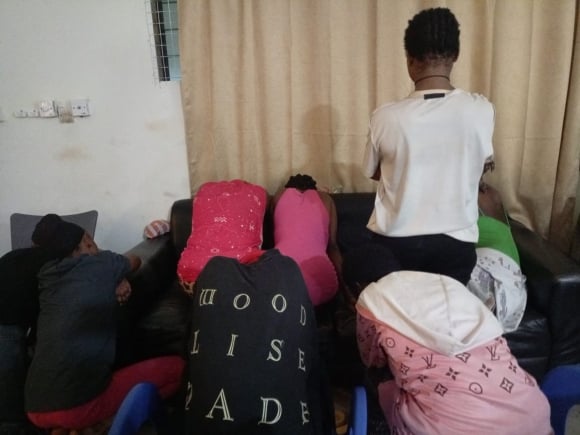This incident unveils a grim reality of human trafficking, highlighting the vulnerability of young women seeking better economic opportunities and the brutal exploitation they face at the hands of criminal syndicates. The victims, all Nigerian women between the ages of 18 and 28, were lured to Ghana under the false pretense of legitimate employment, a common tactic employed by traffickers to prey on the hopes and aspirations of vulnerable individuals. Upon arrival, these women were stripped of their freedom and forced into the sex trade, subjected to horrific conditions and inhumane treatment designed to ensure their compliance and maximize profits for their captors. The operation to rescue these women shines a light on the collaborative efforts of law enforcement to combat human trafficking, and underscores the importance of continued vigilance and community involvement in identifying and reporting such criminal activities.
The orchestrated deception and subsequent exploitation of these women paint a disturbing picture of the methods employed by trafficking rings. The promise of lucrative jobs in Ghana served as the bait, preying on the desire for economic advancement. This manipulative tactic is often effective, particularly in regions with limited employment opportunities, driving individuals to take risks in pursuit of a better life. Once trapped in this exploitative web, the women were subjected to a dehumanizing system of control involving both physical and psychological abuse. The enforced daily quotas and the brutal punishments for failing to meet them, such as being forced to consume and use human excreta for hygiene, demonstrate the depravity of the traffickers and the extreme vulnerability of their victims. The physical and psychological scars inflicted upon these women will undoubtedly require extensive support and rehabilitation to overcome.
The discovery of a locally manufactured shotgun, dried leaves believed to be Indian hemp, and a half-gallon of suspected drug-laced alcohol during the raid suggests a wider network of criminal activity, encompassing not only human trafficking but potentially also drug trafficking and other illicit activities. The presence of these items indicates a dangerous environment for the victims, highlighting the risks they faced beyond the forced sex work itself. The arrest of six Ghanaian men suspected of aiding the traffickers points to the involvement of local collaborators, who play a crucial role in facilitating the operation of such transnational criminal networks. These local accomplices provide logistical support, offer protection, and ensure the smooth functioning of the trafficking operations, making their apprehension a significant step in dismantling the entire network.
The alleged ring leader, identified only as “Baby Rich,” remains at large, highlighting the challenges in bringing traffickers to justice. The fact that he is on the run suggests a level of organization and awareness within the trafficking network, allowing key figures to evade capture. His escape underlines the need for continued investigation and cross-border cooperation to apprehend him and ensure he is held accountable for the crimes committed against these women. The severity of the abuse inflicted on the victims, including beatings, forced consumption of human excreta, and the insertion of pepper into their private parts, speaks to the complete disregard for their well-being and the calculated cruelty employed to maintain control.
The ritualistic initiation at a shrine, involving being stripped naked, shaved, and forced to swear oaths, adds a layer of psychological manipulation to the ordeal. This process serves to further dehumanize the victims, break their spirits, and instill fear, making them less likely to resist or attempt escape. The threats of madness or death associated with escape attempts reinforced the sense of hopelessness and ensured compliance. These ritualistic elements not only demonstrate the traffickers’ control but also highlight the profound psychological trauma inflicted on the victims.
The rescue of these women and the subsequent arrests represent a crucial step in the fight against human trafficking. The women are now under the care of authorities, receiving the necessary medical attention and psychological support to begin their journey of recovery. The six arrested suspects are in police custody, assisting with the ongoing investigation, which will hopefully lead to further arrests and the dismantling of the entire trafficking network. The transfer of the case to the Human Trafficking Unit of the Ghana Immigration Service signifies the seriousness with which the authorities are treating this crime and their commitment to bringing the perpetrators to justice. The collaborative effort between different law enforcement agencies underlines the importance of a multi-pronged approach in combating this complex issue. The commitment of law enforcement to dismantling trafficking rings, coupled with public awareness and reporting of suspicious activities, is critical in protecting vulnerable individuals and bringing those responsible to justice.














